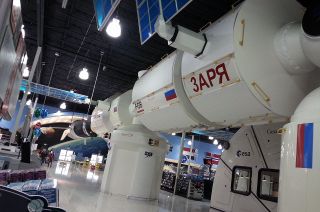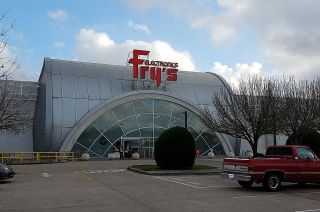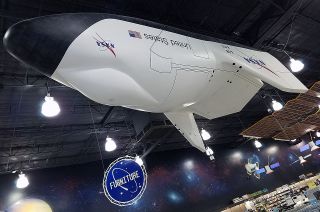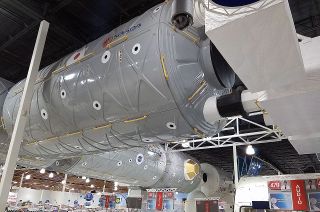Full-size mock International Space Station closes with end of Fry's Electronics

The International Space Station has gone out of business — in a Houston suburb.
Fry's Electronics closed all of its retail stores on Wednesday (Feb. 24), including its Webster, Texas location, which featured a one-of-a-kind, full-scale mockup of the sprawling orbital complex. The real International Space Station (ISS) remains in operation, overseen by the flight controllers at the nearby NASA Johnson Space Center in Houston.
"After nearly 36 years in business as the one-stop-shop and online resource for high-tech professionals across nine states and 31 stores, Fry's Electronics, Inc. has made the difficult decision to shut down its operations and close its business permanently as a result of changes in the retail industry and the challenges posed by the Covid-19 pandemic," the company said in a statement posted Wednesday to its website.
Related: Coronavirus pandemic: full space industry coverage

The closures bring to an end the family-run business, which became known for building each of its stores around a different, often elaborate theme, including the Egyptian pyramids, the lost city of Atlantis and the story of "Alice in Wonderland." The Burbank, California location featured a retro-sci-fi theme from Hollywood and the Anaheim store included a space shuttle flight deck.
The Fry's in Webster, which opened in 2004, set itself apart by having something that not even NASA or any of international partners have: a life-size representation of the ISS spanning the length of a football field. (Johnson Space Center's training facility has mockups of each of the modules, but omits the truss and solar arrays.)
Contained within a building that itself was shaped to resemble the space station's modules and truss segments, the ISS mockup sat among — and above — aisles of computer and electronic products. Oversized modules served as demonstration rooms and a cafe.
Get the Space.com Newsletter
Breaking space news, the latest updates on rocket launches, skywatching events and more!

Though not entirely accurate to the configuration of the space station deployed in orbit, the Fry's ISS did include representations of its major elements, including the U.S. Destiny lab, Quest airlock and Cupola; Russia's Zvezda service module and Zarya functional cargo block (FGB); Japan's Kibo laboratory modules; and the European Space Agency's Columbus lab. Mounted to a simplified truss backbone was a replica of the Canadarm2 robotic arm.
The store's space station also featured a Russian Soyuz spacecraft on approach to a docking with the ISS, as well as astronauts (mannequins) in spacesuits out on "spacewalks" around the complex.
As customers first entered the store, they walked under another visiting spacecraft — NASA's X-38 emergency crew return vehicle. One of two mockups of the re-entry craft, it was one of the few details that was outdated from the start. The X-38 was canceled in 2002, two years before the store opened. (Another example was the inclusion of the NASDA logo on some of the modules, the predecessor agency to the Japan Aerospace Exploration Agency, or JAXA, that was founded in 2003.)

Given the store's theme, the Webster Fry's became a draw for space enthusiasts visiting the nearby Space Center Houston and other space-related locations in the Houston-area. For at some time during the store's run, it catered to this audience by selling packages of astronaut freeze-dried ice cream and several other space-themed souvenirs.
As of Wednesday there was no word what was to become of the space station or any of the installations in the other Fry's stores.
"The company will implement the shut down through an orderly wind down process that it believes will be in the best interests of the company, its creditors and other stakeholders," Fry's stated on its website. "It is hoped that undertaking the wind-down through this orderly process will reduce costs, avoid additional liabilities, minimize the impact on our customers, vendors, landlords and associates, and maximize the value of the company's assets for its creditors and other stakeholders."
Click through to collectSPACE for more photos of the International Space Station mockup inside the Fry’s Electronics store in Webster, Texas.
Follow collectSPACE.com on Facebook and on Twitter at @collectSPACE. Copyright 2021 collectSPACE.com. All rights reserved.
Join our Space Forums to keep talking space on the latest missions, night sky and more! And if you have a news tip, correction or comment, let us know at: community@space.com.

Robert Pearlman is a space historian, journalist and the founder and editor of collectSPACE.com, an online publication and community devoted to space history with a particular focus on how and where space exploration intersects with pop culture. Pearlman is also a contributing writer for Space.com and co-author of "Space Stations: The Art, Science, and Reality of Working in Space” published by Smithsonian Books in 2018. He previously developed online content for the National Space Society and Apollo 11 moonwalker Buzz Aldrin, helped establish the space tourism company Space Adventures and currently serves on the History Committee of the American Astronautical Society, the advisory committee for The Mars Generation and leadership board of For All Moonkind. In 2009, he was inducted into the U.S. Space Camp Hall of Fame in Huntsville, Alabama. In 2021, he was honored by the American Astronautical Society with the Ordway Award for Sustained Excellence in Spaceflight History.

